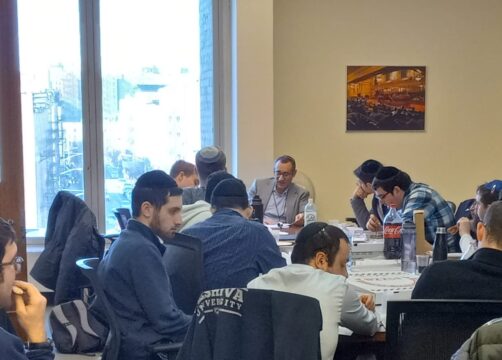 Dr. Daniel Rynhold speaks to students about Rav Kook.
Dr. Daniel Rynhold speaks to students about Rav Kook.On January 25, 2023, the Zahava and Moshael Straus Center for Torah and Western Thought, in partnership with the Jay and Jeanie Schottenstein Honors Program, hosted Dr. Daniel Rynhold, dean and professor of Jewish philosophy at the Bernard Revel Graduate School of Jewish Studies, and director of the Revel doctoral program. Dr. Rynhold spoke to students about "Heresy and Heretics in the Thought of Rabbi Abraham Isaac HaKohen Kook."
Rabbi Kook was the first Ashkenazi Chief Rabbi of pre-state Israel, a leading philosopher of Jewish thought and a founding father of Religious Zionism. Born in the Russian Empire in 1864, Rabbi Kook was educated at the renowned Volozhin Yeshiva and was invited in 1904 to become the rabbi of Jaffa. After a brief sojourn in London during World War I, Rabbi Kook was made Chief Rabbi of Jerusalem and then ascended to the newly established Chief Rabbinate of British Mandatory Palestine. Rabbi Kook, who wrote prolifically in the areas of halakha and Jewish thought, is famous for his enthusiastic support of the Zionist movement, which he perceived to be a precursor to the spiritual redemption of the Jewish people. Besides being active in the Religious Zionist movement, Rabbi Kook also expressed his support for secular Zionists. He saw them as fulfilling a sacred duty in cultivating the Land of Israel.
Rav Kook's respect for the secular Zionists and his readiness to examine unorthodox writings, such as those of the seventeenth-century Dutch philosopher Baruch Spinoza, underscored his appreciation for ideas and developments external to Judaism, even if he didn't always agree with them. Dean Rynhold demonstrated how this unique appreciation for contrary opinions stemmed from Rabbi Kook's mystical conception of God and reality.
Citing Orot, a collection of Rabbi Kook's writings originally published in 1920, Dean Rynhold directed the students' attention to passages discussing the origin of earthly controversies. In Rabbi Kook's estimation, all aspects of reality are encompassed by God's infinitude. However, finite mortals are only able to comprehend a partial perspective of reality. Thus, each individual inevitably selects that perspective of reality that appeals to him, leading to controversies between individuals and societies.
This is not to say that, in Rabbi Kook's philosophy, every opinion once expressed rings true, only that there is truth in every opinion that is expressed. The role of the "righteous," according to Rabbi Kook, is to try to reveal the broader perspective of God and reality in order to "mend, integrate, and extend peace in the world…exemplifying an outlook that is comprehensive and universal" (Orot HaKodesh, 1:1:107, trns. Bezalel Naor).
Dean Rynhold concluded that elements of Rabbi Kook's philosophy of controversy are particularly relevant in our age of fierce political tribalism. He reflected on the importance of being open to debate. By engaging in dialogue, Dean Rynhold asserted, we refine our own arguments by understanding those expressed by others.
On that note, Dean Rynhold opened himself up to debate, responding to challenging points raised by students, many of whom are studying Rabbi Kook's writings in the Straus Center course "Rav Kook," taught by Rabbi Shalom Carmy. This seminar was the latest in a series of programs sponsored or co-sponsored by the Straus Center and the Schottenstein Honors Program. Recent events have included a conversation with the Jerusalem Post's Zvika Klein, a debate between Tablet's Liel Leibovitz and YU's own Rabbi Daniel Feldman, a lunch seminar with Adam Kirsch of The Wall Street Journal, a philosophical discussion with Dr. Ronen Shoval of The Tikvah Fund and book talk with Dr. Gil Troy of McGill University.
You can learn more about the Straus Center by signing up for our newsletter here. Be sure to also like us on Facebook, follow us on Twitter and Instagram and connect with us on LinkedIn.
